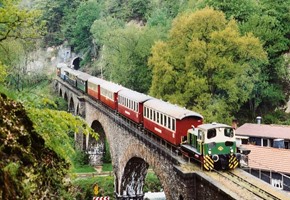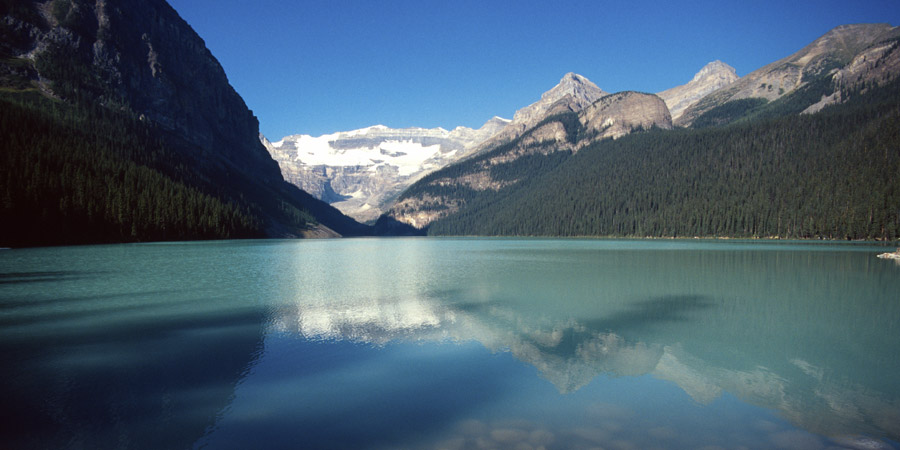
The Music of Railways: The Top Five
18/06/2018 · By Jack Stacey
The sound of the railway is a symphony unto itself and has inspired artists and musicians across the world to compose music about and on the theme of rail travel
Read moreBoasting breathtaking national parks and countless culturally rich towns and cities, there's seemingly no end of enticing things to see and do in Canada. Discover picture-postcard landscapes, where dramatic snow-capped peaks soar above dense pine forests and mirror-like lakes reflect impossibly blue skies. If you're lucky, you might just catch a glimpse of the black bears, grizzlies, wild cats and host of other birds and wildlife that make this wilderness their home. From cosmopolitan Toronto to laid-back Vancouver, you'll find Canada's cities equally compelling, marrying scenic views with metropolitan culture, excellent restaurants and vibrant museums and galleries.
Experience a brighter future and soak up the colours of the world with Great Rail Journeys. These long-haul adventures feature all the fabulous inclusions you know and love from Rail Discoveries' holidays. You'll have a Tour Manager with you throughout and the peace of mind that everything's included in one great price, alongside an incredible dose of authentic worldwide culture. Along the way, you'll also tick off those unmissable, iconic landmarks while getting to the heart of local culture as you're introduced to the authentic sights, sounds and flavours of each place you visit. And of course, it wouldn't be a Great Rail Journeys holiday without unforgettable rail experiences. Whether you're heading to Canada or Cambodia, expect front-row seats to the most spectacular scenery on earth as you're whisked through the landscapes in comfort on the world's most iconic railways.
Operated by

Find out more with a free brochure and enjoy weekly travel inspiration and offers in our e-newsletter.
Boasting breathtaking national parks and countless culturally rich towns and cities, there's seemingly no end of enticing things to see and do in Canada. Discover picture-postcard landscapes, where dramatic snow-capped peaks soar above dense pine forests and mirror-like lakes reflect impossibly blue skies. If you're lucky, you might just catch a glimpse of the black bears, grizzlies, wild cats and host of other birds and wildlife that make this wilderness their home. From cosmopolitan Toronto to laid-back Vancouver, you'll find Canada's cities equally compelling, marrying scenic views with metropolitan culture, excellent restaurants and vibrant museums and galleries.
Experience a brighter future and soak up the colours of the world with Great Rail Journeys. These long-haul adventures feature all the fabulous inclusions you know and love from Rail Discoveries' holidays. You'll have a Tour Manager with you throughout and the peace of mind that everything's included in one great price, alongside an incredible dose of authentic worldwide culture. Along the way, you'll also tick off those unmissable, iconic landmarks while getting to the heart of local culture as you're introduced to the authentic sights, sounds and flavours of each place you visit. And of course, it wouldn't be a Great Rail Journeys holiday without unforgettable rail experiences. Whether you're heading to Canada or Cambodia, expect front-row seats to the most spectacular scenery on earth as you're whisked through the landscapes in comfort on the world's most iconic railways.

Canada has four distinct seasons, with warm summers and famously bitter winters. This is a country that is enigmatic at any time of the year, so when you choose to visit comes down to personal preference. The immense size of the country means that the weather can differ depending on where you chose to visit, but generally June to August is Canada's high season, with pleasant temperatures and plenty of sunshine. If you're travelling in winter, or to the far north of the country, expect extremely cold weather. With temperatures dropping well below freezing point in many areas, thermal underclothes are a must, as well as waterproofs, a hat, scarf and gloves. A good pair of snow or walking boots will also prove handy, especially if you're planning on exploring the great outdoors.

While Canada has produced many culinary delights, there is perhaps none quite as famous as poutine. Consisting of fries topped with a rich meat-based gravy and fresh cheese curds, this world-renowned dish can be found in just about any diner in Canada, including McDonalds. Canada is also celebrated for its seafood, with an abundance of fresh fish and shellfish caught off its coasts. When in Maritime provinces, sampling fresh lobster rolls is a must; a generous portion of plump lobster meat in mayonnaise dressing, lightly seasoned and piled into a toasted bread roll - this delicious delicacy can be found in numerous seafood shacks and eateries along the coast.
Canadians are generally relaxed, and are recognised for their friendly and polite nature. Visitors to the country should make an effort to emulate their warmness - a simple please and thank you will go a long way, as will a sincere smile. When visiting Québec or another French speaking area, brushing up on some simple French phrases and greetings will also be greatly appreciated.
Tipping is expected in the service industry, with the standard amount in a sit-down restaurant being between 15% and 20% of the overall price. It is also important to remember when shopping that sales tax is generally added on at the cash register, so you should anticipate the final price being slightly higher than that marked on the label. Canada's currency is the Canadian Dollar (CAD). Notes are available in $5, $10, $20, $50 and $100 denominations, while $1, $2 (known as "the loonie and the toonie"), 50c, 25c, 10c, 5c, and 1c all come in coin form.
As with all travel, organising adequate travel insurance is essential. British citizens do not need a visa in order to visit Canada, but will need to apply for an Electronic Travel Authorisation (eTA) in order to enter. 911 is the emergency number in Canada, and should be used for emergency police, fire or medical assistance.